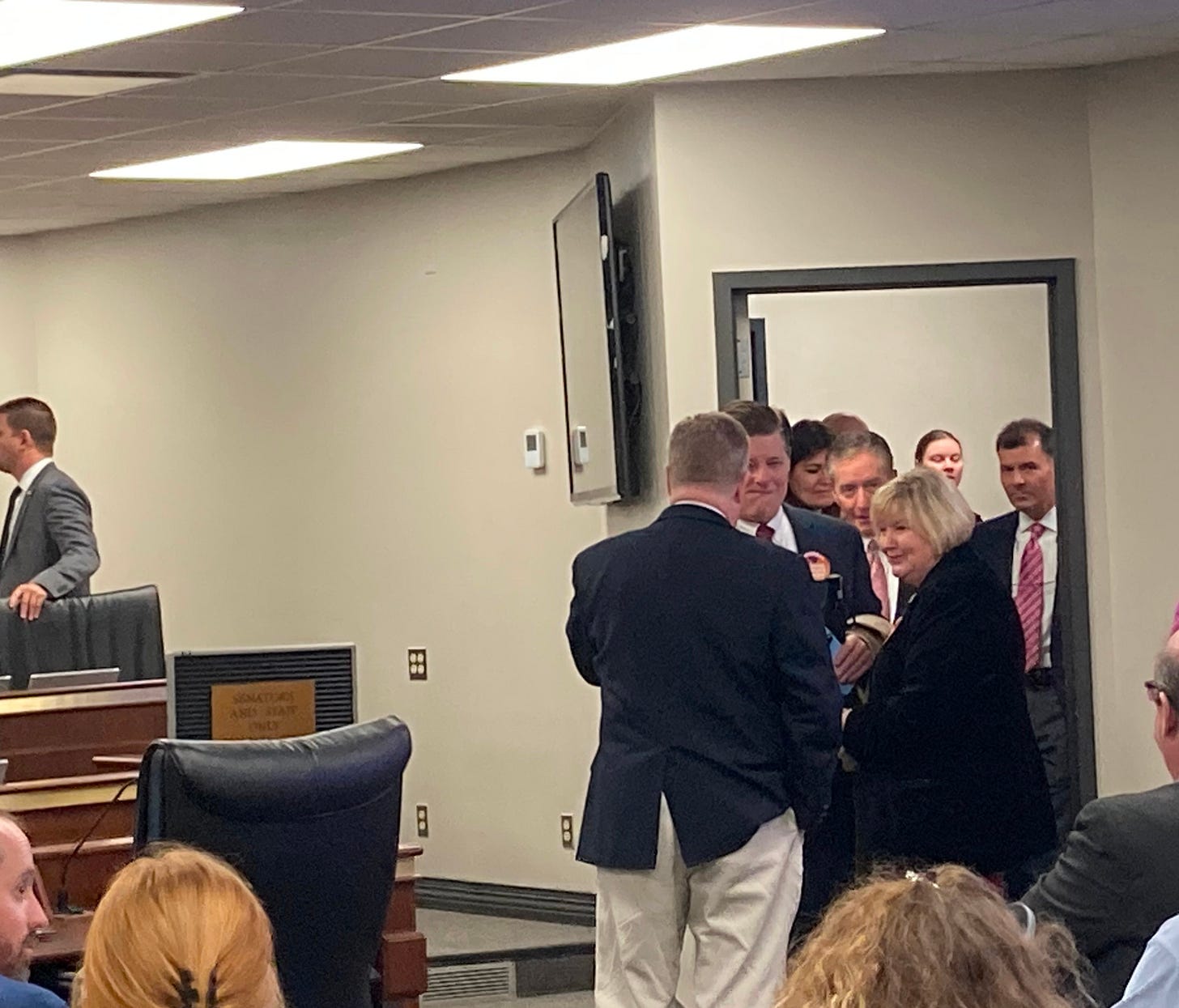SC Senate Committee’s #1 Priority: Vouchers
They aren’t letting the recent state Supreme Court decision stop them
You’re basically taking it out of that pocket and putting it in this pocket.
-Senate Education Chair Greg Hembree
No money shall be paid from public funds nor shall the credit of the State or any of its political subdivisions be used for the direct benefit of any religious or other private educational institution.
Vouchers are a top priority for the education subcommittee.
A subcommittee of the South Carolina Senate Education committee met this morning for its last time this year, to discuss what is apparently its main priority for the new session: passing another school voucher bill.
Tellingly, while two senators who sit on the subcommittee (Senators Brad Hutto and Ross Turner) were absent due to other Senate obligations, Representative Shannon Erickson (a longtime voucher supporter) had made it over from the House to attend, as had Oran Smith (who recently overcame objections about his history editing a neo-Confederate magazine to be appointed to the Commission on Higher Education) and Wendy Damron, president of Palmetto Promise Institute (a position formerly held by Superintendent of Education Ellen Weaver).
So Good a [Lost] Cause (Part 1)
Note: this piece is Part 1 of a series. Part 2 can be found here. CW: Racism, white supremacy, racially-motivated terrorism and murder, racist language. Update: as predicted, Smith was confirmed.
The meeting centered around a summary of a bill which will be pre-filed tomorrow, according to Senate Education Chair Greg Hembree. He also said the subcommittee’s first meeting of 2025 will center on debate around this legislation, suggesting that school vouchers are, for whatever reason, a major priority in the legislature.
There’s no paywall on this piece, because I think it contains a lot of important public information, but if you can help me continue this work by subscribing or donating, I really appreciate it!
What will the pre-filed bill actually do?
Most of the short meeting was devoted to a presentation by Donna Barton.
Barton started by referencing the elephant in the room: the recent Supreme Court decision which predictably found the parts last “Education Scholarship Trust Fund” bill that directed public money to private schools unconstitutional. Barton repeatedly indicated that the new bill to be pre-filed, the “K-12 Education Lottery Scholarship,” was drafted in light of that court decision.
While the new bill isn’t yet available to the public, Barton said it will expand eligibility requirements to families making 600% of the federal poverty income level (up from 400% of the federal poverty level), and will remove all other eligibility criteria except a state residency requirement. (According to an expert present at the meeting, 600% of the federal poverty level is $ 187,200 for a family of 4 in 2024.)
The bill will also expand the list of eligible expenses to cover uniforms and transportation, and will implement a “rolling” application approach instead of requiring families to apply during specific windows (a requirement of the old bill which was presumably included to avoid the chaos of schools making funding decisions based on constantly-changing enrollment throughout the year).
A shift to using Education Lottery Funds to pay for vouchers.
But the most significant change would be the pre-filed bill’s new source of funding: South Carolina Education Lottery funds. The South Carolina Education Lottery raises money through ticket sales to benefit public K-12 public schools, to provide scholarships for higher education, and to repair state school buses, among other education-related expenditures.
Hembree and Barton indicated that the Lottery funds would not be used at the expense of existing programs funded by the lottery, because these other programs would be moved over to general appropriations (thereby possibly creating a loophole because the Lottery funds are described as being separate from general funds). But they didn’t explain how they could promise that future legislative sessions would continue to appropriate that funding. (In effect, they can’t promise that, because current legislators can’t constrain future legislative sessions when it comes to the budget.)
The bill would also change the amount families receive for private educational services from around $6,000 to around $8,000. The Department of Education would also be required create a “model inter-district policy” (essentially adding an open enrollment clause that allows students to use vouchers for schools outside of their home districts).
Would this new bill be constitutional?
That still seems doubtful, based on Barton’s description.
Keep reading with a 7-day free trial
Subscribe to Other Duties (as assigned) to keep reading this post and get 7 days of free access to the full post archives.


![So Good a [Lost] Cause (Part 1)](https://substackcdn.com/image/fetch/$s_!PrYw!,w_1300,h_650,c_fill,f_auto,q_auto:good,fl_progressive:steep,g_auto/https%3A%2F%2Fsubstack-post-media.s3.amazonaws.com%2Fpublic%2Fimages%2F830e2e05-8460-4774-a7e3-360496d8e2e7_768x768.png)
